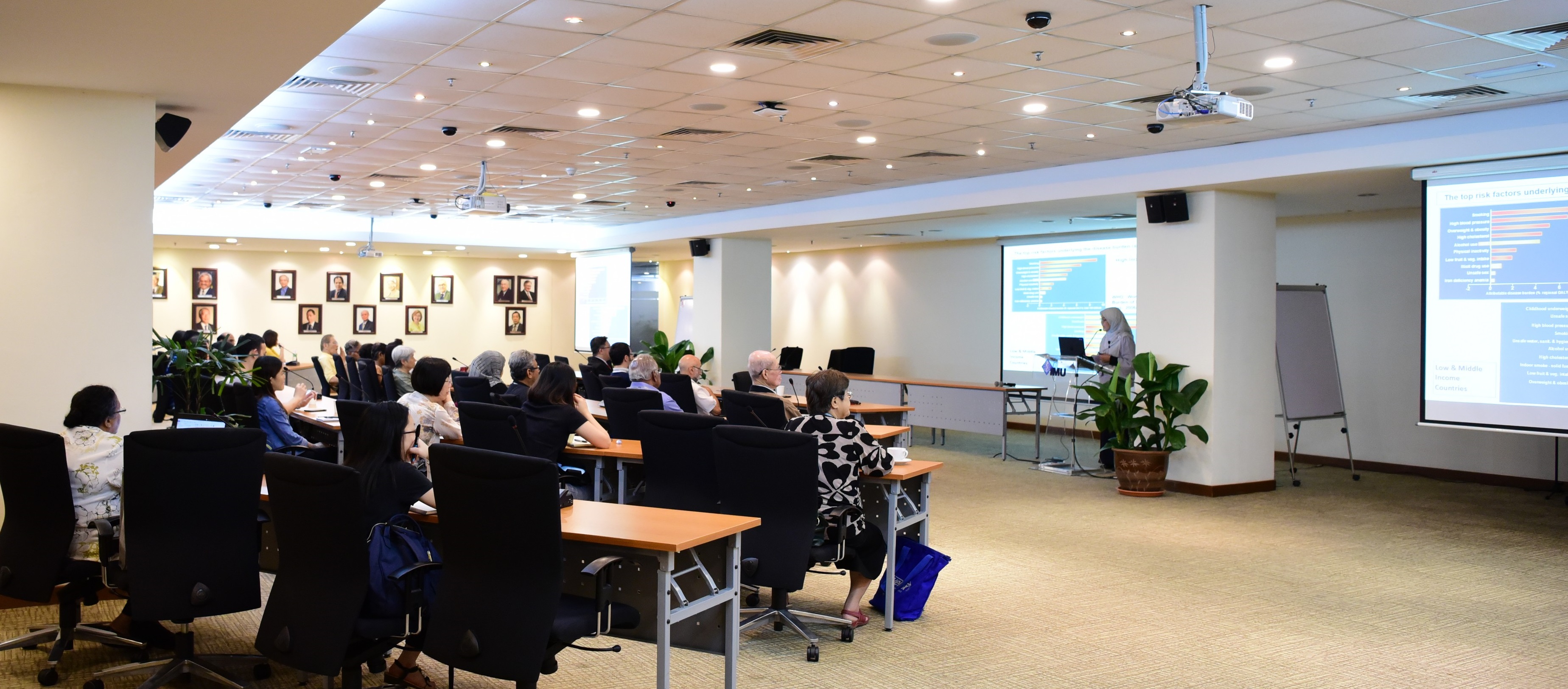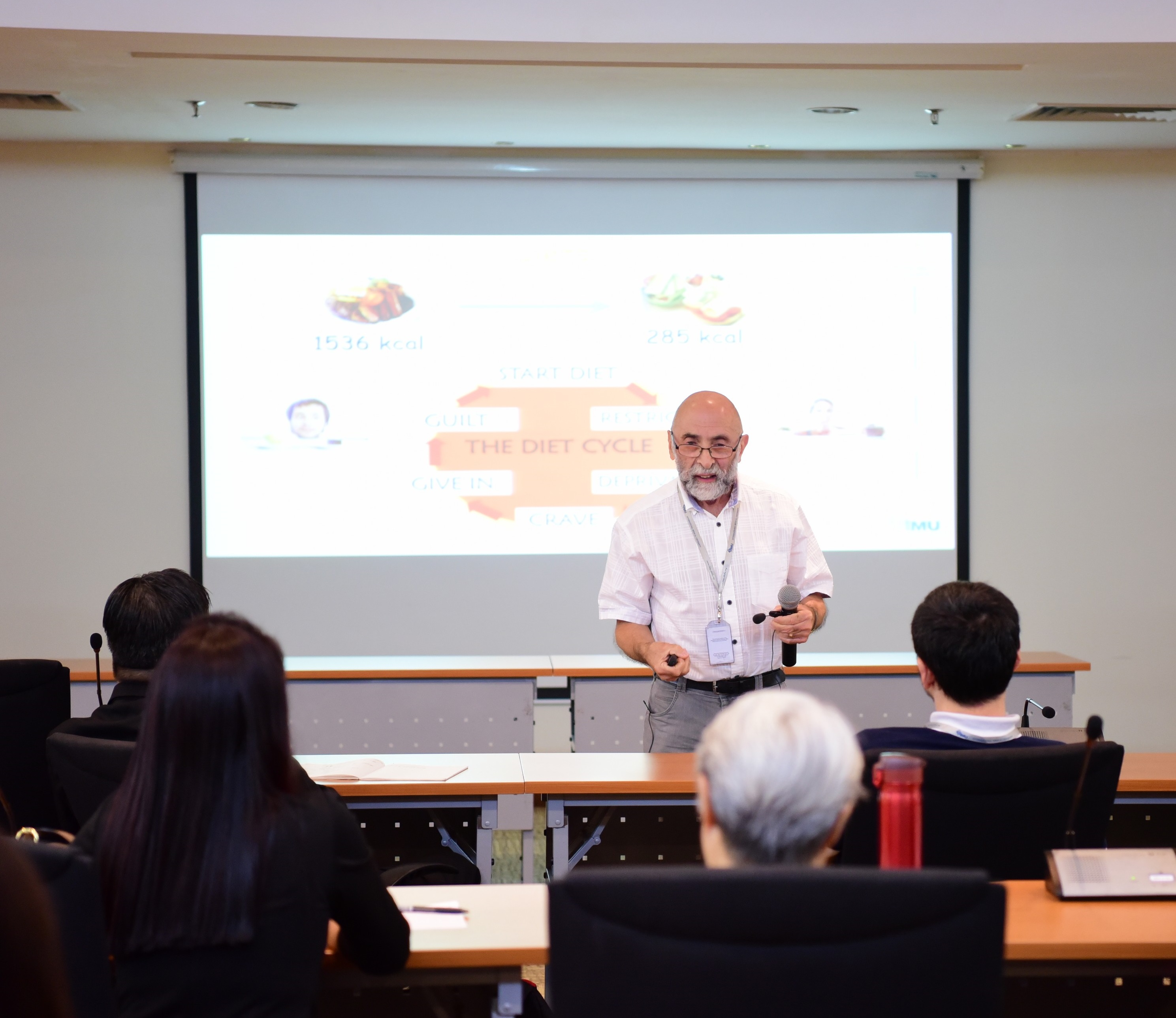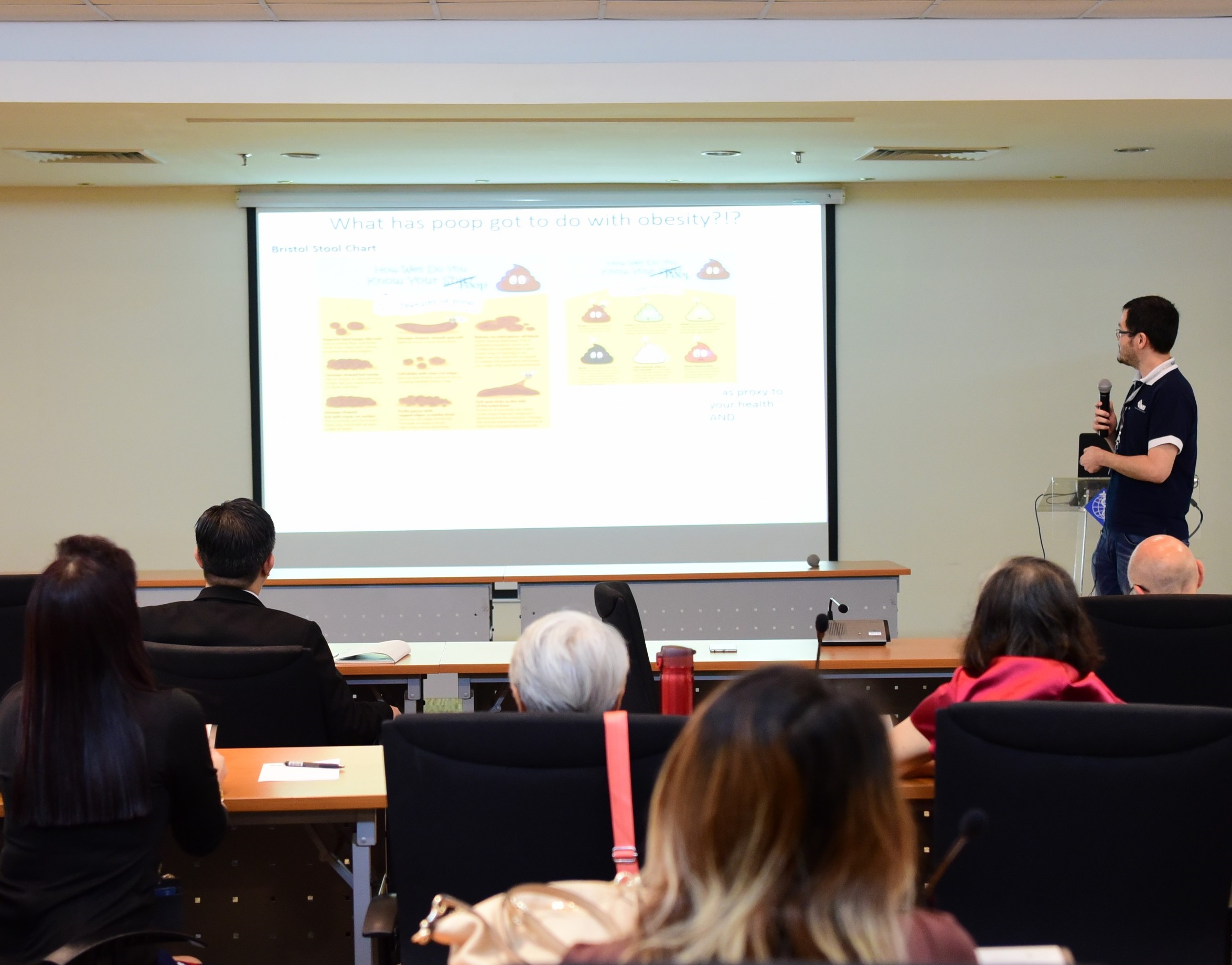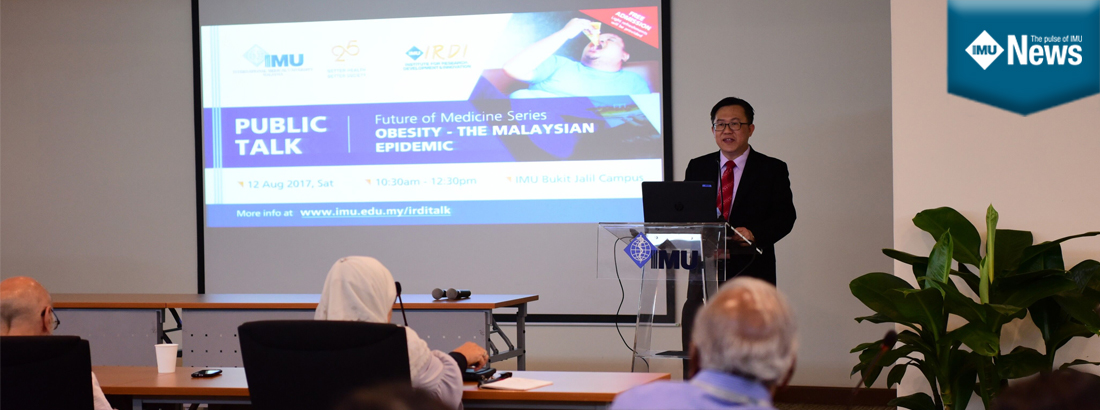According to a survey by the Public Health Institute of the Ministry of Health, Malaysia is the most obese country in Asia. The survey revealed that nearly 50% Malaysian citizens are obese, with 2 in 5 Malaysian adults obese. In addition, childhood obesity is a big problem in this country, with about 7% obese children from five years old and below. For the individuals who fight daily battle with obesity, the main causes of their conditions could be attributable to an unhealthy diet, a sedentary lifestyle, and perhaps some unlucky genes. In recent years, scientists have uncovered that the trillions of gut bugs lurking in our human bowels can be linked to overweight and obesity.
As part of the Future of Medicine Series, the Institute for Research, Development, and Innovation (IRDI), International Medical University (IMU) had successfully organised a public talk titled “Obesity – The Malaysian Epidemic” on 12 August 2017 at IMU, Bukit Jalil. The public talk brought together physicians, nutritionists, pharmacists, scientists, and other healthcare professionals to delve into the health issues related to the topic. It was part of the Future of Medicine Series of Public Talks organised by IRDI to inspire, inform, and create curiosity amongst the general public on new developments in science and medicine.
 The primary aim of this public talk was to raise awareness amongst the general public on the obesity epidemic in Malaysia as well as the urgent need of mitigating measures to tackle the problem. The three keynote speakers in this public talk were A/Prof Rokiah Don who is a lecturer from the Division of Nutrition and Dietetics, Prof Brian Furman, Emeritus Professor and Research Professor from University of Strathclyde, United Kingdom, as well as Dr Ivan Yap Kok Seng, the Head of the Department of Life Sciences, School of Pharmacy and Head of the Centre for Translational Research, IRDI.
The primary aim of this public talk was to raise awareness amongst the general public on the obesity epidemic in Malaysia as well as the urgent need of mitigating measures to tackle the problem. The three keynote speakers in this public talk were A/Prof Rokiah Don who is a lecturer from the Division of Nutrition and Dietetics, Prof Brian Furman, Emeritus Professor and Research Professor from University of Strathclyde, United Kingdom, as well as Dr Ivan Yap Kok Seng, the Head of the Department of Life Sciences, School of Pharmacy and Head of the Centre for Translational Research, IRDI.  The public talk commenced with A/Prof Rokiah narrating the statistics of the prevalence of overweight and obesity in the country and the top risk factors underlying the disease in Malaysia. Subsequently, A/Prof Rokiah emphasised that interventions are crucial in tackling obesity. Aside from healthy lifestyle interventions, it also involves shared responsibilities between the government sectors, food and beverage industries, non-government organisations, social media, professional bodies, and the communities. Besides, “Hard Policy” approach should also be implemented in order to create a more supportive environment. For instance, legislation and enforcement on advertising and marketing of fast food, location and operating hours of 24-hours restaurants, the food choices of fast food restaurants, and tax exemption or subsidy for healthier foods but no tax exemptions for less healthy foods.
The public talk commenced with A/Prof Rokiah narrating the statistics of the prevalence of overweight and obesity in the country and the top risk factors underlying the disease in Malaysia. Subsequently, A/Prof Rokiah emphasised that interventions are crucial in tackling obesity. Aside from healthy lifestyle interventions, it also involves shared responsibilities between the government sectors, food and beverage industries, non-government organisations, social media, professional bodies, and the communities. Besides, “Hard Policy” approach should also be implemented in order to create a more supportive environment. For instance, legislation and enforcement on advertising and marketing of fast food, location and operating hours of 24-hours restaurants, the food choices of fast food restaurants, and tax exemption or subsidy for healthier foods but no tax exemptions for less healthy foods.  On the other hand, Prof Brian deliberated on the treatment and prevention of overweight and obesity. Fundamentally, overweight and obesity can be tackled by diet and exercise. The individual should have sheer determination to control the diet by eating fewer calories than the body requires and at the same time increasing the calorie usage with increased physical activities such as exercise. Drugs can be another option to be considered, which is effective only as part of a treatment involving diet and lifestyle changes. When all these attempts to lose weight have failed and the person’s health is at stake, surgery is the last alternative to be considered. Bariatric surgery serves to reduce the size of the stomach by tying it with a gastric band or through removal of a portion of the stomach. It can also be in the form of re-routing the small intestine to a small stomach pouch in a procedure called gastric bypass surgery. However, bariatric surgery is only advisable when the patient is either morbidly obese (body mass index, BMI > 40) or severely obese (BMI > 35) with one or more obesity-associated conditions.
On the other hand, Prof Brian deliberated on the treatment and prevention of overweight and obesity. Fundamentally, overweight and obesity can be tackled by diet and exercise. The individual should have sheer determination to control the diet by eating fewer calories than the body requires and at the same time increasing the calorie usage with increased physical activities such as exercise. Drugs can be another option to be considered, which is effective only as part of a treatment involving diet and lifestyle changes. When all these attempts to lose weight have failed and the person’s health is at stake, surgery is the last alternative to be considered. Bariatric surgery serves to reduce the size of the stomach by tying it with a gastric band or through removal of a portion of the stomach. It can also be in the form of re-routing the small intestine to a small stomach pouch in a procedure called gastric bypass surgery. However, bariatric surgery is only advisable when the patient is either morbidly obese (body mass index, BMI > 40) or severely obese (BMI > 35) with one or more obesity-associated conditions.  Last but not least, Dr Ivan delivered an interesting talk on the association of gut microbes with obesity. While cohabitating in the ecosystem of our intestines, these microscopic bugs contribute to digestion by helping us to break down tough plant fibres. New evidence indicated that these gut bugs alter the way our bodies store fat, particularly the visceral fats which are the fats around the organs, and thus setting the stage for obesity. Studies also revealed the diversity of these gut microbes is related to the likelihood of obesity, with diverse communities of bacteria are linked to having a normal weight, while fewer types of bugs are connected to overweight and obesity. The more astounding fact is that these gut bacteria are inheritable and can be transferred to the new-born babies in pregnant ladies. In order to contribute to weight loss in overweight persons, researchers have been looking into the approach of transferring faeces from normal weight to overweight people. Nevertheless, an easier and simpler approach is by enriching our foods with beneficial bacteria by consuming probiotics such as lactobacilli in yogurt.
Last but not least, Dr Ivan delivered an interesting talk on the association of gut microbes with obesity. While cohabitating in the ecosystem of our intestines, these microscopic bugs contribute to digestion by helping us to break down tough plant fibres. New evidence indicated that these gut bugs alter the way our bodies store fat, particularly the visceral fats which are the fats around the organs, and thus setting the stage for obesity. Studies also revealed the diversity of these gut microbes is related to the likelihood of obesity, with diverse communities of bacteria are linked to having a normal weight, while fewer types of bugs are connected to overweight and obesity. The more astounding fact is that these gut bacteria are inheritable and can be transferred to the new-born babies in pregnant ladies. In order to contribute to weight loss in overweight persons, researchers have been looking into the approach of transferring faeces from normal weight to overweight people. Nevertheless, an easier and simpler approach is by enriching our foods with beneficial bacteria by consuming probiotics such as lactobacilli in yogurt. 
The take-home message from this public talk is that there is no magic cure to overweight and obesity. The rise in obesity numbers can affect the economy as more money will be spent to treat obese people who are susceptible to many diseases, including type 2 diabetes. Treating such medical complications is more costly than preventive measures. Hence, prevention is still better than cure. There is no other way than to eat fewer calories than the body requires and increase the calorie usage.









